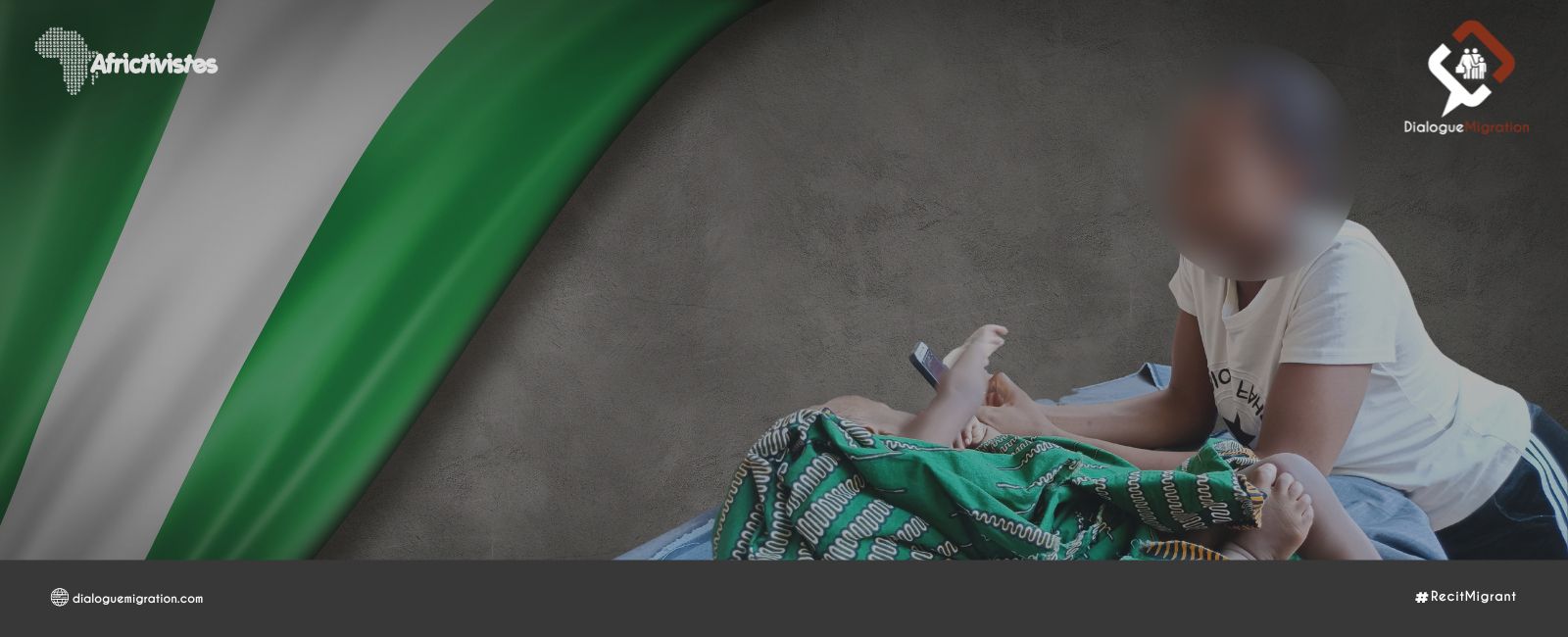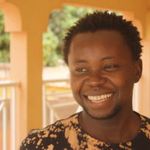

To escape the lust of her mother’s husband, 18-year-old Mirabelle decides to leave the family unit in Nigeria for Burkina Faso, abandoning her mother and five youngest children. But in the host country, the illusion turns short for the girl. Coming with the promise of a well-documented job in stores in Burkina Faso, Mirabelle realizes once on the ground that it is a scam. She will later be compelled to become a sex worker with a pimp. An adventure that ends with the birth of a child whose father refuses paternity. Assailed by the trials of life, Mirabelle becomes a champion of good morals with her sisters. Dialogue Migration meets with a young lady whose life seems turbulent.
Burkina Faso, Sunday. The sky is sunny in the capital Ouagadougou. This did not hamper our appointment with Mirabelle, at her tutor’s place who has been hosting her for the last eight months. When we arrive, Mirabelle is busy in the kitchen. She makes porridge for her crying baby. Tears certainly due to hunger, but also to this heat wave of March. Warmly and with a smile, the young woman welcomes us with a good evening with an English accent. After feeding her baby, she tells us point-blank: “I’m yours”. Before continuing.
Tumultuous life
“I am Mirabelle. I’m from Nigeria, from the city of Owerri, from Imo State,” is how she begins her story. She remembers arriving in Burkina Faso in March 2021. “We came by road through Benin. The trip lasted four days. It was tiring because we were changing buses,” she says. From her hometown Owerri, she arrives in Faso without knowing in which city she finds herself. Her travel ticket will remind her that it is Bobo Dioulasso. From there, she will be taken to a village called Poura-Carrefour. “There were a lot of us. I don’t know how many,” she recalls.
It was at a hair salon in Nigeria, where she and her friend went to make themselves beautiful, that they heard a group of women talking about work opportunities in Burkina Faso. They said that ” in Burkina Faso, you earn a lot of money in a short time by working in shops,” she said. Interested, she inquired and was put in contact with a man who was to transport her to Burkina Faso. Arriving at the final destination, the situation changes. Initially, she was told that the cost of her transport from Owerri to Poura-Carrefour was 1,300,000 FCFA, and that she had to pay it. “In reality, the transport is not even worth 100,000 fcfa,” says the young lady. Second, it was not paid work in a store as he was led to believe, but rather prostitution. “We were housed in houses called hills; a kind of tent made with plastic bags,” she recalls, describing the conditions in which she lived with the other girls. Between sighs, she confides: “We only worked at night. Work was hard, starting at 5 p.m. and ending at around midnight or beyond.”
When we ask how much she gains in this night activity, she looks up to the sky, biting her lower lip as if to give herself a certain capacity, then answers: “I was making a lot of money but this money was meaningless”. In reality, she continues, “I couldn’t spend that money because I was working for a pimp.” Mirabelle has no choice, and will have to work hard to be able to reimburse the 1,300,000 fcfa. Eyes soaked in tears and hoarse throat, she confides: “I earned between 20,000 and 25,000 FCFA on days when business was going well, and between 10,000 and 15,000 FCFA the other days”. The service cost 1,000 FCFA per client. She had to pay her rent which amounted to 30,000fcfa per month, not to mention the right of the soil which is added to all these expenses. She was able to repay the 1,300,000 FCFA after five months. Acquitted of her debts, she was “released”. She will leave, with relief, her ‘hill’ house of Poura-Carrefour for Ouagadougou.
Ouagadougou, another apocalypse
Believing to change her lifestyle by going to Ouagadougou, Mirabelle will quickly become disillusioned. She is forced to pursue the same “activity” in order to survive. “It’s difficult. It is thanks to God that I live. I do not know anyone here. Which makes life difficult especially since I have a child whose father is not with me; moreover, he did not accept the paternity of the child.”
From then on, the young mother fends for herself to feed herself, feed her child, pay rent and bills. Worse, no member of her family knew of her departure for Burkina Faso: “When I left for Burkina Faso, my mother was not aware. I only called her three months later. She cried with all her strength on the phone, believing I was dead. She prayed every day for me to come back, but she was still glad that I was alive.”
Even if she regrets the conditions in which her child was born, in him, she seems to find a smile, hope and comfort. “My child is my life,” she says.
Life circumstances robbed Mirabelle of her adolescence and made her mature very early. At only 18 years old, she is a mother. Something that gave her another understanding of life. “When I was in school there was a book I read that was titled ‘All that glitters is not gold’. At the time I did not understand anything about the meaning but today everything is clear. Then a song by the artist Salatiel with the title Anita that says that ‘all that glitters is not gold out here” https://www.youtube.com/watch?v=OYagB3K-9co
Between sobs, Mirabelle confesses: “I have only bad memories. When I remember the moments spent with the ‘customers’, I feel very sad.”
Reconversion
Mirabelle’s desire is to break up with her painful past characterized by things she “regrets”. She says she has turned the page, while sending a message to her little sisters: “No matter what difficulties you go through with your parents, it is always better to live with them, because no one in the world can love you like your parents.” A reconversion that attests to an awareness. “When I was with my mother, she forbade me certain things and I thought she didn’t love me, but today, I understand everything, especially since I became a mother in my turn.”
Drawing life lessons, Mirabelle believes that life can sometimes be surprising and overwhelming, but that we must continue to fight while hoping for a better tomorrow. The one who says she loves the soumbala (culinary condiment prepared from the grain of néré) from Burkina Faso and who complains about the strong heat, advises young people against migration: “When you are too young, there are risks”.
What if it had to be done again? To this question, she bluntly answers: “It is not a good path”. As of today, Mirabelle started learning, from a lady three months ago, how to make wigs. Journalism, her childhood dream, is still on her mind.


